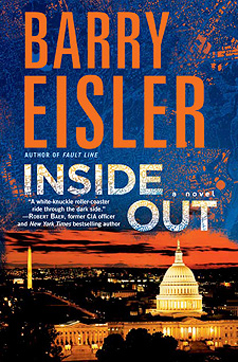It’s quite a pleasure to spend a morning sitting in Charlottesville, Virginia, where all the bookstores display thrillers by local boy John Grisham, and read a thriller as good or better than any of Grisham’s and written by one of us – a blogger who supports what is now a strictly left wing concept: the rule of law.
“Inside Out” by Barry Eisler is written, as are Grisham’s novels, like a movie, complete with gratuitous sex interest and predictable plot twists. The illumination it shines on the nature of torture and the politics of torture could be removed. The political analysis of the last 50 pages could be deleted. And 90 percent of the book could be turned into a mindless Hollywood thriller.
But the insights into the emotions of the characters come from the author’s honest assessment of torture, murder and what these things do to the torturers and the murderers. There is plenty of machismo and stupidity and narrow vision in the characters in this book, but none in the writing of its author. The plot imagines, plausibly enough, that the CIA’s torture video tapes have been stolen, not destroyed. What follows from that premise is likely enough, although manipulated in the direction of allowing the fate of the universe to come down to fist fights.
Busy schedule? Click here to keep up with Truthout with free email updates.
For an anti-torture novel, the protagonists seem at first to be improbable choices. There are no victims here and no opponents of torture, no lawyers and no journalists – just the rather jarring practice of naming the characters with the real names of progressive bloggers. There is, however, on sharp display, the process through which participants in the system and on its edges are corrupted – those who might become whistleblowers or might, on the contrary, sell their souls.
There’s something else that gives the author insight into just that sort of character, something explicitly spelled out in the analysis that creeps into the closing chapters: fatalistic, nihilistic, spectatorship. The lesson of this book is not that we are farther gone down the road to fascism than we thought and need to pull ourselves together quickly with greater sacrifices. The lesson is that we’re too far gone. It is too late. All is hopeless. And if the narrative didn’t make this as clear as a brick to the forehead, the author spells it out in a 48-word end note.
The premise of the novel is that the American public would object to the practices of torture long documented with the written word if videos were released. But this book seems to assume that Americans will no more react to a book about the videos than they have to written descriptions of the torture. That may very well be true. But can Eisler really have written this book without even a glimmer of a spark somewhere deep down inside him telling him it just might make a little bit of difference?
Maybe he did. But that doesn’t mean we have to agree. That doesn’t mean that when we persuade our torture-supporting friends to read “Inside Out” we shouldn’t hold out the possibility that it might do some good. None of Eisler’s characters accept each other’s wisdom or desires or, for that matter, orders delivered with a gun to their head. Why should we? The wisdom to understand the severe corruption of the current moment still falls short of the wisdom to see that past moments of the same sort have never lasted forever. Whether we can observe people as well as Eisler does or not, we can know better than to believe that our responsibility stops at observation.
Our most important fundraising appeal of the year
December is the most critical time of year for Truthout, because our nonprofit news is funded almost entirely by individual donations from readers like you. So before you navigate away, we ask that you take just a second to support Truthout with a tax-deductible donation.
This year is a little different. We are up against a far-reaching, wide-scale attack on press freedom coming from the Trump administration. 2025 was a year of frightening censorship, news industry corporate consolidation, and worsening financial conditions for progressive nonprofits across the board.
We can only resist Trump’s agenda by cultivating a strong base of support. The right-wing mediasphere is funded comfortably by billionaire owners and venture capitalist philanthropists. At Truthout, we have you.
We’ve set an ambitious target for our year-end campaign — a goal of $150,000 to keep up our fight against authoritarianism in 2026. Please take a meaningful action in this fight: make a one-time or monthly donation to Truthout before December 31. If you have the means, please dig deep.
